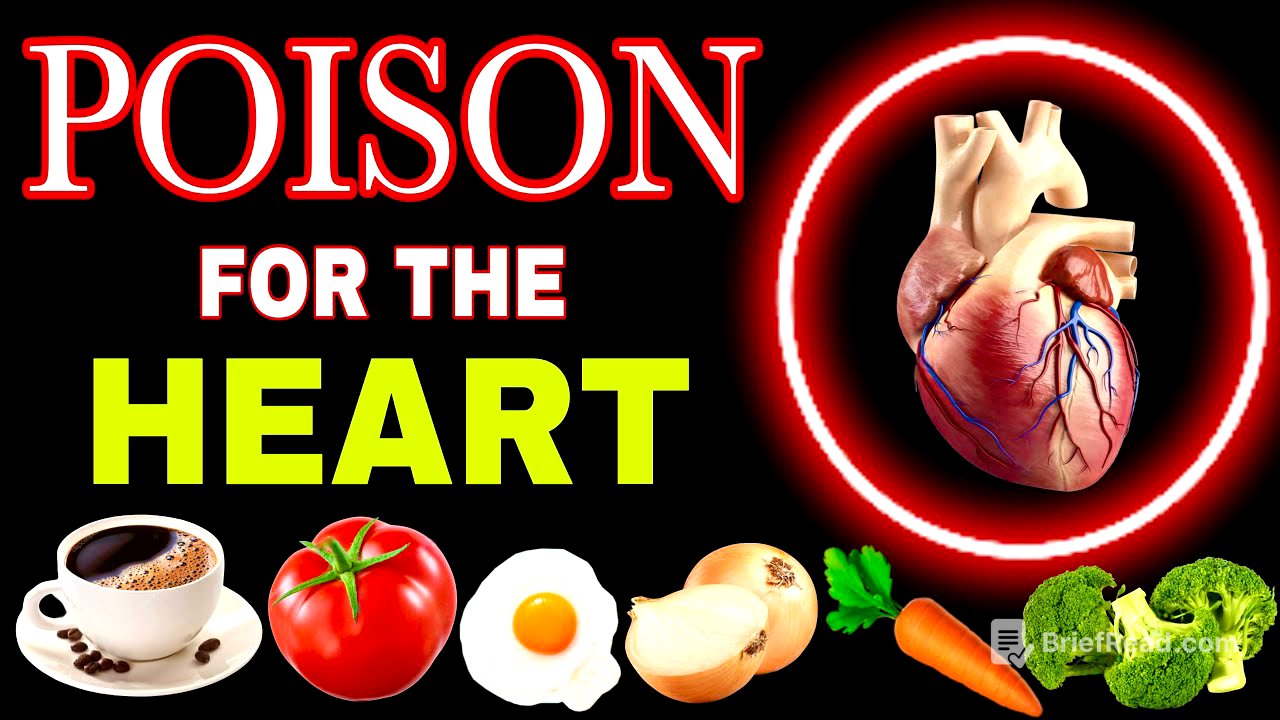TLDR;
This video by Dr. João Sorio discusses key habits and foods that impact heart health, aiming to reduce the risk of cardiovascular diseases. It covers managing blood sugar and blood pressure, avoiding smoking and excessive alcohol, understanding the role of genetics and stress, addressing sleep disturbances, and maintaining healthy cholesterol and vitamin D levels. The video also emphasizes the importance of physical activity and a diet rich in antioxidants, listing 14 heart-healthy foods and nine to avoid.
- Managing blood sugar and blood pressure are crucial for heart health.
- Avoiding smoking, excessive alcohol, and ultra-processed foods is essential.
- Incorporating heart-healthy foods like legumes, seeds, oatmeal, and olive oil can significantly reduce cardiovascular risk.
Managing Blood Sugar Levels [0:38]
Maintaining healthy blood sugar levels is crucial for cardiovascular health, not just for diabetics. Pre-diabetic levels, indicated by fasting glucose levels of 100 mg/dL or higher (or 6.1 mmol/L), and glycated hemoglobin levels between 5.7% and 6.4%, increase cardiovascular risk. Elevated blood sugar can damage the inner lining of blood vessels, leading to endothelial injury and fat accumulation, making diabetes a major risk factor for heart disease.
Controlling High Blood Pressure [2:42]
Maintaining optimal blood pressure is vital for heart health. An ideal blood pressure reading is around 120/80 mmHg to minimize cardiovascular risk. High blood pressure forces the heart to work harder, damaging blood vessels and increasing the risk of kidney problems and stroke.
Avoiding Smoking and Alcohol Misuse [3:36]
Smoking, including e-cigarettes and cigars, is detrimental to heart health. Excessive alcohol consumption, defined as more than one drink a day, can also increase heart disease risk. While small doses of alcohol, like one glass of wine, might have slight cardiovascular benefits, exceeding this amount is harmful.
Understanding Genetics and Managing Stress [4:23]
Genetics play a significant role in heart diseases, making family history vital for medical tests and treatment plans, especially concerning cholesterol goals. Stress is also a risk factor, with higher stress levels correlating with increased heart problems like heart attacks.
Addressing Sleep Disturbances [5:05]
Obstructive sleep apnea, characterized by interrupted oxygen flow during sleep, is a major cardiovascular risk. It can destabilize blood pressure and increase blood sugar levels. Sleeping less than 6 hours or having irregular sleep patterns also elevates the risk of cardiovascular diseases.
Maintaining Healthy Cholesterol Levels [5:56]
Cholesterol is essential for hormone production and cell formation, but high levels, especially high LDL (bad cholesterol) and low HDL (good cholesterol), are problematic. Ideal HDL levels are above 40 mg/dL for men and above 50 mg/dL for women. LDL targets vary based on individual risk factors, with lower values recommended for those with existing heart conditions. Triglycerides should be kept below 150 mg/dL to avoid increased cardiovascular risk and pancreatitis.
Ensuring Adequate Vitamin D Levels [8:03]
Low vitamin D levels are linked to cardiovascular diseases. While vitamin D is known for its role in calcium absorption and bone health, it also impacts immunity and heart health. Aim for vitamin D levels above 30 ng/mL, but be cautious of exceeding 80 ng/mL to avoid toxicity.
Adopting an Active Lifestyle [9:19]
Regular physical activity, aiming for over 150 minutes per week, significantly boosts heart health. This can be achieved through 30 minutes of exercise five times a week or 50 minutes three times a week.
Nutrition and Antioxidants [10:01]
A diet low in antioxidants is a risk factor for heart disease. The video lists 14 heart-healthy foods and nine to avoid, emphasizing that regular consumption of harmful foods poses the greatest risk.
Worst Foods for Heart Health [10:43]
Foods to avoid include ultra-processed foods, instant noodles (high in sodium), corn or fructose syrup, lard, coconut oil, butter, fatty cheeses, processed meats (high in sodium and preservatives), and fried foods (high in saturated fats). Consuming these foods three or more times per week significantly increases cardiovascular risk.
Best Foods for Heart Health [16:53]
The video lists 14 heart-healthy foods: legumes (beans, lentils, chickpeas), seeds (chia, flax), oatmeal (though diabetics should monitor carb intake), dark chocolate (70% cocoa), beetroot, eggs, green leafy veggies, peppers, berries, avocado, nuts, grapes, fish rich in omega-3 (salmon, tuna, sardines), coffee (in moderation), and olive oil.









